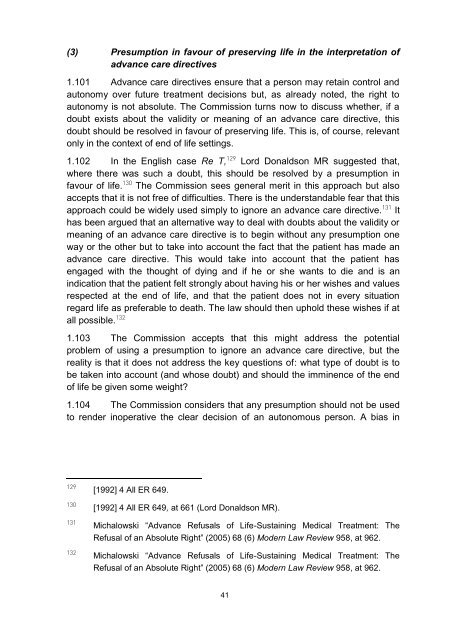Report on Bioethics: Advance Care Directives - Law Reform ...
Report on Bioethics: Advance Care Directives - Law Reform ...
Report on Bioethics: Advance Care Directives - Law Reform ...
You also want an ePaper? Increase the reach of your titles
YUMPU automatically turns print PDFs into web optimized ePapers that Google loves.
(3) Presumpti<strong>on</strong> in favour of preserving life in the interpretati<strong>on</strong> ofadvance care directives1.101 <strong>Advance</strong> care directives ensure that a pers<strong>on</strong> may retain c<strong>on</strong>trol andaut<strong>on</strong>omy over future treatment decisi<strong>on</strong>s but, as already noted, the right toaut<strong>on</strong>omy is not absolute. The Commissi<strong>on</strong> turns now to discuss whether, if adoubt exists about the validity or meaning of an advance care directive, thisdoubt should be resolved in favour of preserving life. This is, of course, relevant<strong>on</strong>ly in the c<strong>on</strong>text of end of life settings.1.102 In the English case Re T, 129 Lord D<strong>on</strong>alds<strong>on</strong> MR suggested that,where there was such a doubt, this should be resolved by a presumpti<strong>on</strong> infavour of life. 130 The Commissi<strong>on</strong> sees general merit in this approach but alsoaccepts that it is not free of difficulties. There is the understandable fear that thisapproach could be widely used simply to ignore an advance care directive. 131 Ithas been argued that an alternative way to deal with doubts about the validity ormeaning of an advance care directive is to begin without any presumpti<strong>on</strong> <strong>on</strong>eway or the other but to take into account the fact that the patient has made anadvance care directive. This would take into account that the patient hasengaged with the thought of dying and if he or she wants to die and is anindicati<strong>on</strong> that the patient felt str<strong>on</strong>gly about having his or her wishes and valuesrespected at the end of life, and that the patient does not in every situati<strong>on</strong>regard life as preferable to death. The law should then uphold these wishes if atall possible. 1321.103 The Commissi<strong>on</strong> accepts that this might address the potentialproblem of using a presumpti<strong>on</strong> to ignore an advance care directive, but thereality is that it does not address the key questi<strong>on</strong>s of: what type of doubt is tobe taken into account (and whose doubt) and should the imminence of the endof life be given some weight?1.104 The Commissi<strong>on</strong> c<strong>on</strong>siders that any presumpti<strong>on</strong> should not be usedto render inoperative the clear decisi<strong>on</strong> of an aut<strong>on</strong>omous pers<strong>on</strong>. A bias in129130131132[1992] 4 All ER 649.[1992] 4 All ER 649, at 661 (Lord D<strong>on</strong>alds<strong>on</strong> MR).Michalowski ―<strong>Advance</strong> Refusals of Life-Sustaining Medical Treatment: TheRefusal of an Absolute Right‖ (2005) 68 (6) Modern <strong>Law</strong> Review 958, at 962.Michalowski ―<strong>Advance</strong> Refusals of Life-Sustaining Medical Treatment: TheRefusal of an Absolute Right‖ (2005) 68 (6) Modern <strong>Law</strong> Review 958, at 962.41
















